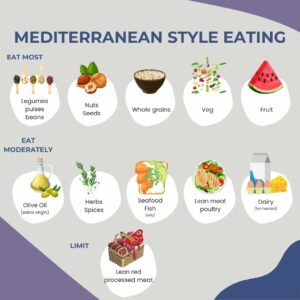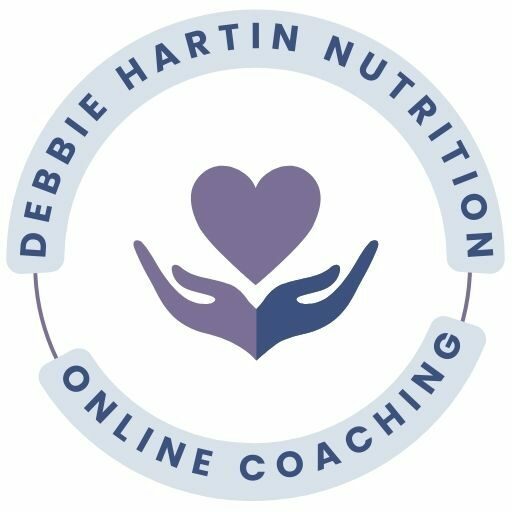As we journey through midlife, menopause, and beyond, prioritising our health becomes increasingly important. Our diet plan for weight loss and health in midlife plays a significant role in our overall well-being, empowering us to thrive through every stage of life. This blog aims to show you how by making small changes, you can enhance your overall health, boost energy levels, and uplift your mood.
QUICK RUN DOWN ON THE MENOPAUSE:
Peri-menopause – This is what women usually refer to when they talk about ‘going through the menopause’. There starts to be a fluctuation in your reproductive hormones, periods may become irregular, and you may start experiencing menopausal symptoms.
Menopause – When you have 12 consecutive months without periods, it signals the end of natural fertility for a woman. It usually happens between the ages of 45-55yrs, with the average age being 51yrs.
Post-Menopause – This follows on after menopause and symptoms will often lessen. There are still considerations to be had for the body, like supporting heart and bone health, for the long term.
There are many many symptoms that can be associated with the peri/menopause including disrupted sleep, vaginal dryness, mood swings, anxiety, brain fog, hot flushes, joint pain, etc. Women can often feel that they are starting early dementia when in fact it can be the peri/menopause.
These really are just a ‘few’ of the symptoms and I would advise looking at Dr Louise Newsons website for evidence-based advice and support if you think that you may be approaching, or could be going through the peri/menopause, and then discussing options of treatment with your GP.
During the peri/menopause there is a change in the balance of your sex hormones and your oestrogen levels decrease. Oestrogen plays a key role in everything from our memory, mood, immune function and heart, to our muscles and even our hair and skin.
Due to the decrease in oestrogen there is a decline in muscle mass and our strength. It can also lead to an increase in appetite, and a reduction in our sleep quality and energy levels.
The change in hormones can also affect our bone health, heart health and mood and it also changes the way we store fat and, unfortunately, it tends to favour the abdominal area! The way we nourish ourselves with food, and movement, going forward is more than just about losing or maintaining weight, it really is about protecting our bodies and our physical and mental health so we can be fit, healthy, and strong as we age.
Tailoring our diet plan for weight loss and weight management during midlife is essential for optimal health and well-being. So, what should we be eating at this time?
I recommend following a Mediterranean style of eating. The research behind this way of eating consistently shows the beneficial effects on several health outcomes:
- Reduced risk of cardiovascular diseases, including heart disease and stroke.
- Potential to lower the risk of developing type 2 diabetes.
- Some studies suggest a decreased risk of certain cancers.
- Growing evidence supporting its role in cognitive health and reducing diseases such as Alzheimers.
- Reducing depressive symptoms and increasing energy & mood
- Supports good gut health.
It’s important to note that individual factors such as genetics, lifestyle, and overall dietary patterns may also influence health outcomes.
What is the Mediterranean way of eating?
The Mediterranean diet features a variety of whole, plant-based foods such as vegetables, legumes, whole grains, nuts & seeds, herbs & spices. It also includes moderate amounts of healthy fats such as extra-virgin olive oil, fermented dairy, seafood, fish and lean poultry.

BONE HEALTH
As we age our bone mineral density declines and there is an increased risk of osteoporosis. It’s important to ensure that we consume a sufficient amount of calcium – Public Health England (PHE) recommends a daily intake of 700mg for adults. You should be able to get all you need in your diet:
Sources of Calcium: Dairy products such as Milk, cheese and yoghurt, green leafy vegetables, soya beans, tofu, tempeh, nuts, fish eaten with the bones (i.e. mackerel/sardines) and calcium fortified products.
Vitamin D helps with calcium absorption and promotes strong bones. Our primary source of vitamin D is produced in the skin when exposed to sunlight. While we can obtain some vitamin D through our diet, it’s often insufficient. Therefore, Public Health England recommends that everyone take a daily 400 IU vitamin D supplement.
Sources of Vit D: Oily fish, egg yolks, fortified foods, red meat
HEART HEALTH
Post-menopausal women are at a higher risk of cardiovascular disease, so it’s important to make dietary changes to lower this risk. Ensuring you have a balanced diet plan for weight loss and weight management and incorporating a heart-healthy diet for midlife can significantly benefit cardiovascular health.
Reduce salt intake – adults should have no more than 6g of salt a day which is about a teaspoon, this includes the salt that’s already in our food. Experiment with herbs & spices to add extra flavour to your meals.
Replace saturated fats – Swap saturated fats like butter for heart-healthy options such as extra virgin olive oil.
Increase fibre – Opt for whole grains, lentils and pulses and incorporate foods such as oats and brown rice. Swap refined carbs such as white bread, pasta etc to whole grain versions. Aim for at least 5 servings of fruit & veg daily.
Include oily fish – UK guidelines are to consume 2 portions of fish each week, with one portion (140g) being an oily fish. Oily fish: Salmon, mackerel, kippers, pilchards, sardines, herring and trout.
Limit red/processed meat – If consuming more than 90g (cooked weight) of red, or processed meat a day, the UK guidelines advise you cut down to 70g.
Other lifestyle factors important for health include avoiding smoking, regular exercise, good quality sleep, and limiting alcohol.
PROTEIN
As we age, our bodies become less efficient at processing protein, highlighting the importance of regular consumption spread throughout the day. A protein rich diet plan for weight loss, weight management and overall health is essential for maintaining optimal muscle health, and can help slow down the onset of natural age related diseases such as sarcopenia.
Sarcopenia is the gradual decline in muscle tissue that typically commences around the age of 50, becoming more pronounced after reaching 60 years of age. It results in a reduction in muscle mass, functional abilities (e.g., standing up, sitting down), and muscle strength.
Sources of protein: Main sources include lean meat, fish, eggs, dairy, quinoa, whey, soy, and meat alternatives like tofu and Quorn. Nuts, seeds, legumes, pulses and whole grains are also good sources of protein.
FOOD & MOOD
While there’s no one-size-fits-all diet for improving mood and energy, evidence suggests that adopting a Mediterranean-style diet can be beneficial for protecting mental health.
The SMILES trial is a study that showed a reduction in depressive symptoms following adherence to a Mediterranean style diet. More info here
Omega-3 can boost your energy and mood levels and also has anti-inflammatory effects. Found in foods such as oily fish (salmon, mackerel, sardines), nuts and seeds such as flaxseed and chia seeds.
Antioxidants found in plant-based foods like olives, olive oil, and green leafy vegetables, contribute to mood regulation and overall well-being. Aim for a diverse range of plant-based foods, targeting at least 30 different varieties per week.
Phytoestrogens found in soybeans, pulses and flaxseed. They contain plant-based compounds that mimic oestrogen in the body. Incorporating these foods into your diet may help alleviate hot flashes and other menopausal symptoms, however the research is mixed on this.
Polyphenols are present in dark-coloured berries, dried herbs, cocoa, nuts, seeds, tea, and coffee. They offer additional mood-boosting benefits and support overall health.
DIET PLAN FOR WEIGHT LOSS, WEIGHT MANAGEMENT & OVERALL HEALTH
If you are looking to lose weight, here’s some tips to get you started.
Be kind to yourself: Losing weight can be challenging, especially as we get older. Take it one step at a time and celebrate all your successes along the way.
Focus on long-term changes: Instead of quick fixes or fad diets, aim for sustainable lifestyle adjustments. These changes are more likely to lead to lasting results.
Set realistic goals: Break down your weight loss journey into manageable steps. Start with small, achievable goals, and gradually build on your progress over time. Click here to access my resources page and download my free 3-tier guide to move you away from the all-or-nothing mindset and learn how to set achievable goals.
Prioritise overall health: Remember that having a diet plan for weight loss is just one aspect of health. Focus on nourishing your body with nutrient-rich foods, keeping hydrated, staying active, managing stress, and getting enough sleep.
By taking a balanced and holistic approach to your diet for midlife, you can improve your overall well-being and set yourself up for long-term success.
Would you like to learn more about how you can nourish yourself through the midlife years? Book a free, no-pressure call with me, and I’ll share some tips and strategies to get you on track to feeling your best.

